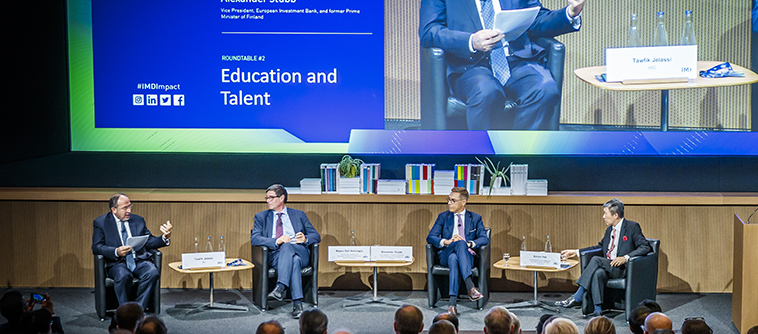“Competitiveness is like a cycling race. If you want to ride fast you need a good bike, a fit rider and a smooth road.”
Arturo Bris, Finance Professor and Director of the World Competitiveness Center, set the scene on day one at a conference celebrating IMD as a trailblazer for the past 30 years in the area of competitiveness research. IMD was the first to study competitiveness, which is now being used to shape policy around the world, and the Center continues to innovate today.
Jean-François Manzoni, IMD President and Nestlé Professor, said research at IMD is rigorous, relevant and insightful and not just about quantifying the obvious. The actionability of the work of the World Competitiveness Center is proven by the fact that it is “used by a number of countries in their policy making.”
The bike
For many of the conference’s speakers, the bike, or motors, to improve competitiveness are clearly the conditions countries put in place to improve their societies, such as education and talent.
Mauro Dell’Ambrogio, Former Swiss Secretary for Education, praised the Swiss system in which there are two paths – the high school to university path – and the vocational path. Dell’ Ambrogio explained how the vocational system is a unique competitive advantage for the country.
For Alexander Stubb, Vice President of the European Investment Bank and Former Prime Minister of Finland, his country’s education system is seen as a shining example around the world because its teachers are trusted, respected, and highly trained. He also cited its autonomy for children. “You have to let kids, be kids.”
If education and talent are parts of the bike, so is fighting corruption. Simon Peh, Independent Commissioner Against Corruption from Hong Kong discussed how fighting corruption helped his country go from a “backwards and small” city, to a growth engine. “We are entrenching an integrity culture in our society.”
“Any country’s long term success depends on education and ability to retain talent.” That was the message from Tawfik Jelassi, Professor of Strategy and Technology Management at IMD and former Minister in Tunisia after the Arab Spring revolution.
The rider
Society, the riders in the competitiveness race, need to agree on where to steer the bike. In order to win they also have to be brave. Experts at the event reflected on building national consensus and having the courage to succeed.
Dainius Kreivys, former Minister of Economy in Lithuania, told the story of how his country was among the hardest hit in the Eurocrisis after Lehmann Brothers collapsed in 2008 and how it recovered the fastest. The politician said one of his biggest lessons is that “a deficit in political will is worse than a deficit in budget”. His government’s bold decisions to make unpopular tweaks to the economy in the face of a “perfect storm” led the country back to the front of the pack and made it one of the most attractive locations for investment in Europe.
H.E. Abdullah Lootah, Director General of Competitiveness in the United Arab Emirates, also had to be brave. At a time when competitiveness was still a murky subject for his country, he became a pioneer in using the metric to improve citizens’ lives in the UAE. Competitiveness research by IMD “made us brave, gave us the guts” to use the concept as a KPI to compete to win. Another area where the UAE is leading the way is its commitment to 50% participation of Women in Parliament. “We have learned to live in a cohesive way. This is what competitiveness has shown us.”
The road
No riders can compete if the road is full of potholes.
For Diego Molano, Former Minister of Technology in Colombia and an IMD MBA Graduate, building a national consensus and concluding a peace deal cleared the path towards a major transformation in his country. “People can now travel and invest.”
Smart cities
Continuing its pioneering spirit 30 years on, the World Competitiveness Center released the very-first edition of the IMD Smart City Index 2019 (SCI) at the event.
Using a ground-breaking approach to the study of cities, the index takes the citizen’s point of view heavily into consideration, shedding light on the importance of aligning policies with their lives and needs.
This is important because citizens are not concerned who does what. “They just want a solution,” said Ng Chee Khern, Permanent Secretary under Prime Minister’s Office, Chairman of GovTech, Singapore.
“In too many indices, we forget the human factor behind what we measure,” explained Bruno Lanvin, President of the IMD Smart City Observatory.
For Prof. Chan Heng Chee, Chair of the Lee Kuan Yew Centre for Innovative Cities at Singapore University of Technology and Design (SUTD), a ‘Smart City’ is not to be confused with a city like Bangalore which hosts innovative companies. “It’s about the city management using innovative technologies.”



